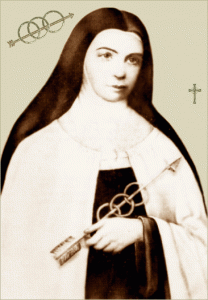
May the most holy, most mysterious and unutterable Name of God be always praised, blessed, loved, adored and glorified in heaven, on earth and under the earth, by all creatures of God, and by the Sacred Heart of Our Lord Jesus Christ in the most Holy Sacrament of the altar.
“This Golden Arrow,” according to Our Lord when He revealed it to Sister Mary of Saint Peter, a Carmelite Nun of Tours in 1843, “will wound My Heart delightfully and heal the wounds inflicted by blasphemy.”
The “delightful wound” sounds like an oxymoron because wounds are generally painful and we try to avoid them. But this wound is different than the ordinary kind. It is a sign of contradiction in every sense of the phrase. First, it is a contradiction in the way that the cross of the crucifix is visually a contradiction, having a horizontal line that intersects a vertical line. The moment that the phrase “delightful wound” crosses the mind it intersects the heart with the enigmatic question, “what (or who) is this?” Second, when we discover Christ, the Lamb of God, and learn of his free choice to suffer so that we might have life, we are wounded by this picture of His love. It has carefully performed a precision piercing in the crust of our hearts and gently pressed into the soft depths beneath to the place where our treasures have been guarded. Having entered into our hearts and transformed them, the sign of the crucifixion is then transformed by our hearts from an image of a senseless killing and a bloody victim into the image of our redemption and the perfect subject of our longing. It is now that the heart begins to see along with the eyes of God the Father how perfect His Son is and how deep our need for His loving sacrifice is. When a heart wounded by His beauty prays fervently a prayer of reciprocating love for Jesus (such as the Golden Arrow), then it wounds His heart in return. In this way the love of God transverses a great chasm that man has carved between himself and his creator, his Father. And that is the third way that the “delightful wound” is a contradiction; adoring the Christ on the cross atones for our sins of disobedience by which we first betrayed and violently wounded Christ because it makes a friend of the one we counted as an enemy.
Resources:
On the Way to Jesus Christ, Ignatious Press 2005; Chaper Two Pgs 32 – 41: Wounded By the Arrow of Beauty, The Cross and the New Aesthetics of Faith
On the Way to Jesus Christ, Ignatious Press 2005; Chaper Three Pgs 46 – 48: Communication and Culture New Methods of Evangelization in the Third Mellennium
Golden Arrow: The Revelations of Sr. Mary of St. Peter, Tan 1990
© Tim Bartel 2009
Why, in the Golden Arrow Prayer, do we ask God that His Name be praised (etc.) by the Sacred Heart of Jesus? Does Jesus not implicitly praise the Name of God, His Father?
I am confused by this particular article in the Prayer. Thank you. JK.
Joe, Thank you for your thought provoking question. It was a pleasure to contemplate an answer, which I hope suffices and which I’m sorry is so late in reply.
The prayer is a private revelation given by Jesus, so we should consider that in asking we are fulfilling the desire of Jesus who is explicitly asking for us to praise the name of his father as does he. Given that praise of God is for the good of the soul of the one praising, Jesus includes himself in the prayer as an example of proper praise. It means, “do as I do”. Think of it this way; Instead of “and by the Sacred Heart…” it could have been written “as it is by the Sacred Heart…” and it would mean the same thing. The prayer is all inclusive, covering the three fold church in these phrases: heaven (the Church Triumphant), earth (the Church Militant), under earth (the Church Purgative). It is also inclusive of its divine members since it mentions Jesus Christ in the Most Holy Sacrament, which is consecrated and effected by the power of the Holy Spirit. Thus the full complement of the Trinity and all of God’s obedient kingdom is encompassed. When seen this way, the prayer expresses a desire for unity in divine praise throughout the Kingdom of God.